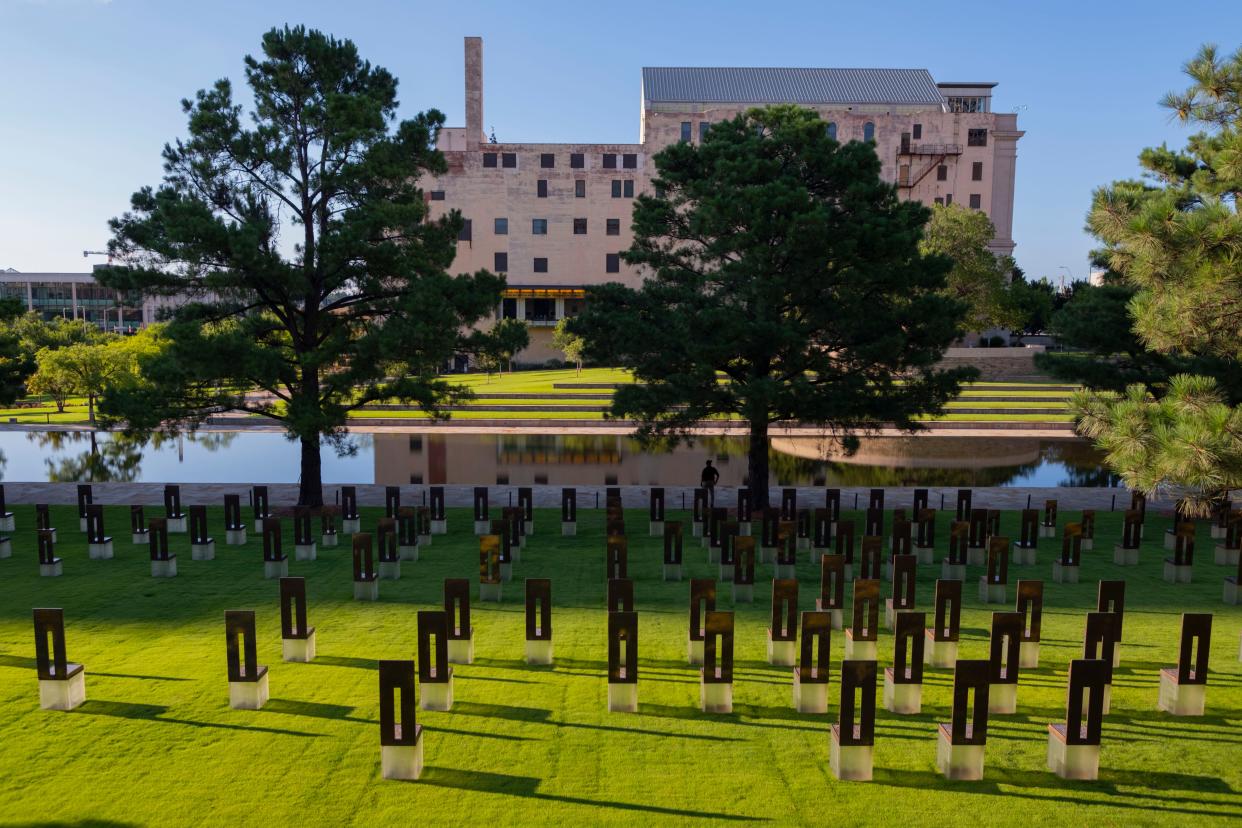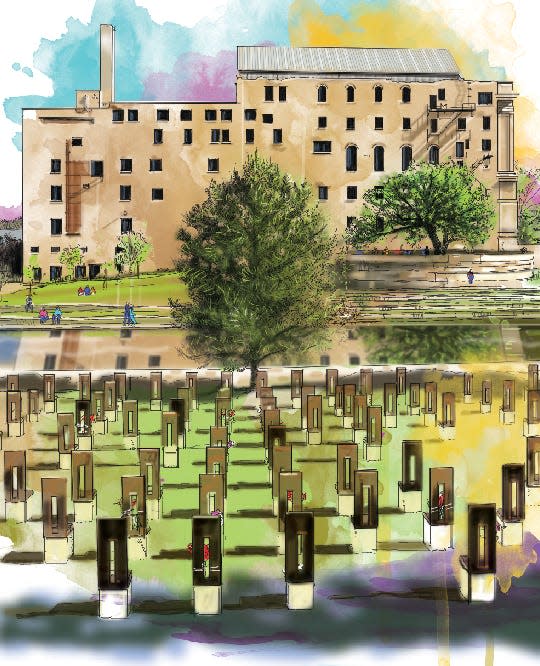OKC bombing, 29 years later: Memories of resilience, compassion amid a painful moment in history

Twenty-nine years ago, Ned Shadid was in charge of a trade show.
Shadid, a member of the Oklahoma Restaurant Association, was chairman of the association’s 57th annual Midsouthwest Foodservice Convention & Exposition. The event was being held at the Myriad — since renamed and now home to Prairie Surf Studios — and the association expected about 10,000 people to attend.
Shadid and his group were ready.
Then, at 9:02 a.m., on April 19, 1995, a bomb went off in Oklahoma City, and Ned Shadid’s life changed.
The restaurant trade show quickly became a resource hub for the thousands of local and out-of-state volunteers who came to Oklahoma City to assist with the recovery efforts after the devastating explosion.
“As we figured out what was happening, I gathered all of our members up and we had a meeting and pretty much said, ‘guys this food show is not going to happen,’” Shadid said. “We were trying to decide what to do from here. Then somebody in the back said, ‘well, we’ve got this food here and we’ve got some cooking equipment. How about we do some food for relief?'”
That conversation initiated an intensive, monthlong effort by association members to cook meals and prepare sandwiches for volunteers and first responders. The group produced 12,000-15,000 meals per day, serving around the clock. In total, more than 300,000 meals were served to those involved in the response effort.
More: Nearly 30 years later, a new documentary shows the OKC bombing to a new generation
Leveraging thousands of dollars of food and donated equipment, the group went full scale. As the trauma from the Murrah Building bombing grew, Shadid and the association expanded their efforts. They also would provide laundry services, housing, medical care and even protective gear for the rescue animals working at the bombing site.
“You never want anything like that to happen again,” Shadid said. “The only thing we could do (for all the volunteers) was do everything in the world we could do to thank them. So that’s what we did.”
For Shadid and others, Friday's 29th anniversary of the bombing of the Alfred P. Murrah Federal Building brings back painful memories and, at the same time, stories and examples of how Oklahomans overcame a tragedy by coming together to help others.
This year, as Oklahomans prepare to honor the victims of the bombing and celebrate those who came to help, The Oklahoman asked a handful of residents what they remembered and what they learned from that dark moment in state history.
Former Sen. Cal Hobson
The impact of the Murrah bombing spread across the state, touching virtually every Oklahoman in some way. That impact is still felt today. Many lost friends or family. Others volunteered to help. Many others did what they could to bring the state back to a sense of normalcy.
But in that moment, thousands of lives were changed forever.
One of those was former state Sen. Cal Hobson.
Hobson, who is also a colonel in the Air National Guard, had just stepped onto the Senate floor when a colleague stopped him.
“Senator Stratton Taylor came onto the floor,” Hobson said. “He said there’s been an explosion downtown and urged the senators from out of town to go home.”
At the same time, Hobson said, he received a telephone call from the Air National Guard, telling him to report to Military Department headquarters. Hobson would quickly transition from state senator to an Army National Guard public affairs official over the next 30 days.
He was stationed downtown at the Guard’s command post.
“We had the press corralled there, hundreds of guardsmen, the police and others there,” he said. “I remember the details vividly.”
While Hobson, a Democrat, was known for his skill in a political fight, what he said he remembers most about the bombing and its aftermath, was the work of a long-time political rival — Republican Gov. Frank Keating.
“This is hard to say, because Gov. Keating always tried to terminate my political career, but Gov. Keating’s most shining moments were his efforts in the bombing. The very day, in the afternoon during a press conference, he began by knocking down rumors, telling people we don’t have the right information yet. It was well done.”
More: Oklahoma City bombing anniversary remembrance ceremony, marathon set for April
Retired fireman Harvey Weathers
Harvey Weathers has a great view of the legislative process in Oklahoma. A sergeant at arms for the Oklahoma House of Representatives, Weathers can easily be spotted wearing his official green jacket.
Most days he directs traffic in the Capitol rotunda and in the lobby of the House, assists lawmakers and, when necessary, his is the voice people hear when the House calls for a vote on legislation.
But on April 19, 1995, Weathers wasn’t at the Capitol. He was a fireman working at the downtown headquarters, Station No. 1, where he served as a communications officer.
“When the explosion hit, stuff started falling out of the ceiling all over my desk,” he said. “By the time I got to the alley behind the station, debris was still falling.”

Weathers said Oklahoma City’s firemen responded immediately. “They didn’t need a phone call,” he said. “They headed out.”
Weathers said Gary Marrs, OKC's fire chief at the time, was in his car when the bomb went off. Marrs dropped off a passenger and then went straight to the scene at the Murrah Building.
“He pulled a general alarm,” Weathers said. “That alarm takes every piece of equipment, every man we have to the scene.”
Weathers worked with dispatchers and representatives of other fire stations to manage resources and address 911 calls.
“I just kept thinking ‘why?’” he said. “'Who did it?' It was absolutely crazy.”
Before long, Weathers would find himself in charge of the headquarters fire station — temporarily.
The firefighters — both local and those who came from across the country — "were amazing," Weathers said.
For years after the bombing, Weathers said he would leave Oklahoma City every April 19 just to put some distance — for a moment — between himself and the trauma he and others lived through. These days, Weathers stays in Oklahoma City on April 19 and even today, he remains emotional about the experience.
"That day is one that none of us will ever forget," he said.
The others, and those who remember
In Oklahoma, April brings spring rains and the occasional tornado.
And, for the past 29 years, the state also has paused to remember those who died, those who survived and those who came together during the bombing of the Alfred P. Murrah Federal Building.
This year, the House of Representatives paused to recognize the many people, whose lives were forever changed that day. House Resolution 1037, authored by Reps. Rick West, R-Heavener, and Ellyn Hefner, D-Oklahoma City, honored the volunteers who came together to rebuild.
West, who worked for the U.S. Department of Agriculture at the time of the bombing, told his colleagues that he lost seven co-workers that day. Each year that he's served as a state representative, he's presented a resolution in the House to remember his co-workers and others killed or injured in the bombing.
"It is gut-wrenching to relive the events of the Oklahoma City bombing," West said in a media statement. "But as legislators and Oklahomans, we have a responsibility. We've got people who were not born when this terrible atrocity happened, so it's up to the ones who remember to tell our stories so that we never, ever forget."
Hefner agreed, adding that the presentation “was a solemn one as we remember those lost and honor the lives of countless others forever changed. The brutality of the attack brought out a brave and tender response."
Oklahoma Agriculture Secretary Blayne Arthur spoke of how her mother was killed in the bombing.
In the House of Representatives, several members of the House and Senate sergeants group assisted in the recovery efforts after the bombing. The sergeants included Weathers, Bobbie Barnett, Joe Bullock, Nita Williams; House Chief of Security John Dawson; and Senate sergeants Rusty Higby and Stewart Meyer.
The future
For men such as Weathers, Shadid and Hobson, the pain from the bombing is still strong and the memories vivid. But each said they remain hopeful that Oklahomans will continue to come together in the face of tragedy.
For Shadid, it wasn't a moment that needed a request. His group, he said, just reacted to the situation. He said chefs from all over Oklahoma City fixed "truly amazing meals," while others provided everything from fresh clothes to medical treatment to translation services for out of state media.
“I remember one guy who came in,” Shadid said. “He was speaking with the governor (Keating).”
The man said he’d been in Oklahoma City for 10 days working at the Murrah bomb site. “He held up a dollar and said, 'this is what I came in with. I had one dollar on me and I still have it.'”
Once the volunteers came to Oklahoma City, Shadid said, they were supported and appreciated and cared for.
“The people were incredible. We were in the right place at the right time and we had the talent to do it,” Shadid said. “It just all worked out. It was a God deal.”
Remembrance Ceremony
The annual Remembrance Ceremony will be at 8:30 a.m. today at the Oklahoma City National Memorial & Museum.
The ceremony will feature 168 Seconds of Silence, music by Point of Grace and the reading of the names of the 168 people who died. The keynote speaker, Caitlin A. Durkovich, with the National Security Council, will discuss "how even 29 years later the United States government is still using lessons learned in the aftermath of the Oklahoma City bombing."
This article originally appeared on Oklahoman: Pain and reslience linger 29 years after Oklahoma City bombing
